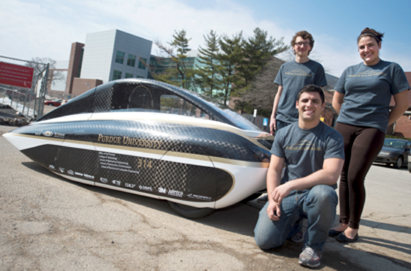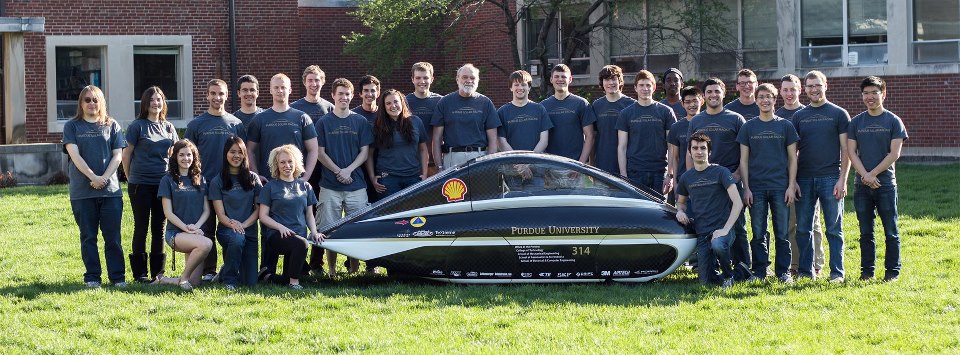Albert Einstein once famously said, “We cannot solve a problem using the same kind of thinking we used when we created them.” Sally Ann Keyes would most likely agree with this sentiment.
Keyes is the President of Purdue Solar Racing, a highly decorated student-led engineering team at Purdue University that is quite literally building the future. Keyes and a team of 35 engineering students are among the top teams competing in the Shell Eco Marathon, an annual competition in which student teams from around the world compete to design, build, and test ultra-energy-efficient vehicles.
Founded in the early ‘90s, the Purdue Solar Racing team has built nine solar-powered racing vehicles to date. After winning the last six Shell Eco-Marathon races, the Purdue Solar Racing team has its eye on a new prize: the American Solar Challenge, a 1,200- to 1,800-mile course which takes approximately a week and a half to complete.
For the Purdue Solar team, designing and building each vehicle represents a massive undertaking, with the average vehicle taking two years to build and involving as many as 50 team members.
Until recently, Purdue Solar managed this highly complex project using Microsoft Project, which worked well enough with a smaller team. However, as the team grew in size and the project expanded in scope, relying on conventional Gantt bars to map out a two-year schedule quickly became unwieldy. Moreover, since the team is constantly pushing the envelope with new engineering concepts, there is naturally a significant amount of uncertainty in the plan – which traditional tools like Microsoft Project are ill-equipped to deal with since they force teams to estimate their tasks in rigid single point blocks of time.
“We really like the fact that LiquidPlanner allows us to estimate our tasks in best and worst-case scenarios, says Keyes. “This should help everyone on the team understand the gating factors that might delay key project milestones. Even though we’ve been doing this for a while now, there will always be changing variables that must be accounted for. We’re also excited about the new Baseline feature, which should prove invaluable in helping our team track progress and improve the way we estimate tasks in the future.”
While Keyes and her team have only been using LiquidPlanner for a short period of time, they have already scheduled out a year-and-a-half worth of tasks. One of the unique challenges that Keyes and her core team must deal with is the fact that student team members are continually joining and leaving the team. From a resource planning perspective, this can be problematic since an individual who’s been assigned a task one week may not be available when it comes time to work on it.
“Another feature that we anticipate will be incredibly useful is predictive scheduling. This will allow us to model our work schedule even if a task has not been assigned to a specific resource. With a team like ours, this is vital since our team members and their availability is constantly in flux,” continued Keyes.
And since the Purdue Solar team is comprised entirely of students who eventually graduate and move on to other endeavors, the team also risks losing valuable institutional knowledge that is generated with the completion of each new vehicle. Keyes and the team believe that a solution like LiquidPlanner will serve as a dynamic knowledge repository that new team members can use to get up to speed quickly so they can hit the ground running.
“We estimate that it can take up to a year for a new team member to get up to speed on the project,” Keyes says. “So we’re constantly looking to improve the way we onboard new team members and are confident that having all of our project-related data in one place where members can easily collaborate with one another will go a long way towards achieving that goal.”
Purdue Solar is just one of over 1,000 educational and non-profit organizations to take advantage of the LiquidPlanner Commitment to Education offer which provides free licenses to qualified organizations. We’ll be watching and rooting for Purdue Solar as they gear up for their next race in 2015. Go Boilermakers!







